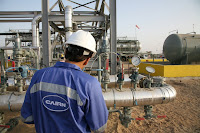 Cairn Energy
Cairn Energy’s oilfields in the Indian state of Rajasthan continue to excite. In a trading statement last week, the company raised its estimate of reserves from 175,000 barrels of oil per day to a potential 240,000 barrels of oil. Cairn’s stock rose nearly 11.5% intraday as the markets greeted the news with much gusto as did the Indian media given the oily needs of the country’s burgeoning economy.
Cairn also hopes the opening of a new 590 km pipeline over the second quarter of 2010, which will connect the Mangala oilfield to Salaya port (in Gujarat state), would further fire-up production. Currently, oil from Mangala is transported by road haulage tankers.
In other trading data, Cairn posted an operating profit of $53 million in 2009, up from $11 million in 2008. Its Chief Executive
Sir Bill Gammell also sounded optimistic about the company's prospects in
Greenland. Cairn is to prospect for oil at four drilling sites in Baffin Bay and estimates these areas could contain over 4.0 billion barrels of oil.
Sir Bill says, "It’ll take stamina, skill and indeed luck to find hydrocarbons in the area." That was probably his philosophy when he bought his company’s Indian assets from
Royal Dutch Shell; and it sure has yielded dividends.
In contrasting fortunes, it seems drilling for the crude stuff off the
Falkland Islands coast may not be economically feasible after all the argy-bargy between UK and Argentina. The prospect of oil in the region renewed diplomatic spats with the Argentine Government complaining to the UN and launching fresh claims of sovereignty on the Falkland Islands, over which in went to war with the British and lost.
UK promptly rejected the recent claims on basis of the right of self-government of the people of the Islands "underpinned by the principle of self-determination as set out in the UN charter". The people are happy to be British subjects and have been for over a century. All the caterwauling now sounds foolish and premature.
In a corporate announcement in London on Monday,
Desire Petroleum – one of the British companies prospecting for oil in the area – said initial results from its Liz 14/19-1 well, in the North Falkland basin prospection zone, showed quantities of oil may be small and of poor quality.
Shares in Desire, recently named among
Deloitte’s upstream upstarts, ended Monday trading in London down nearly 50%.
Rockhopper Exploration, another company drilling in the region with a 7.5% interest in the Liz well, saw its shares tumble 25.5%. Other regional players also took a hit across the board. Desire Petroleum will need to drill further and deeper than anticipated if it has the will to find better quantities of oil and gas. "It will not be possible to determine the significance of the hydrocarbons encountered and whether the well will need to be drilled deeper, suspended for testing or plugged and abandoned," the company said.
 Following on from BP’s bumper profit announcement on Tuesday, Royal Dutch Shell declared a quarterly profits rise of nearly 50% today. In a corporate announcement, the oil giant said profits for the first quarter of the year came in at $4.9 billion; a 49% appreciation on profit noted over the corresponding quarter of 2009.
Following on from BP’s bumper profit announcement on Tuesday, Royal Dutch Shell declared a quarterly profits rise of nearly 50% today. In a corporate announcement, the oil giant said profits for the first quarter of the year came in at $4.9 billion; a 49% appreciation on profit noted over the corresponding quarter of 2009.


